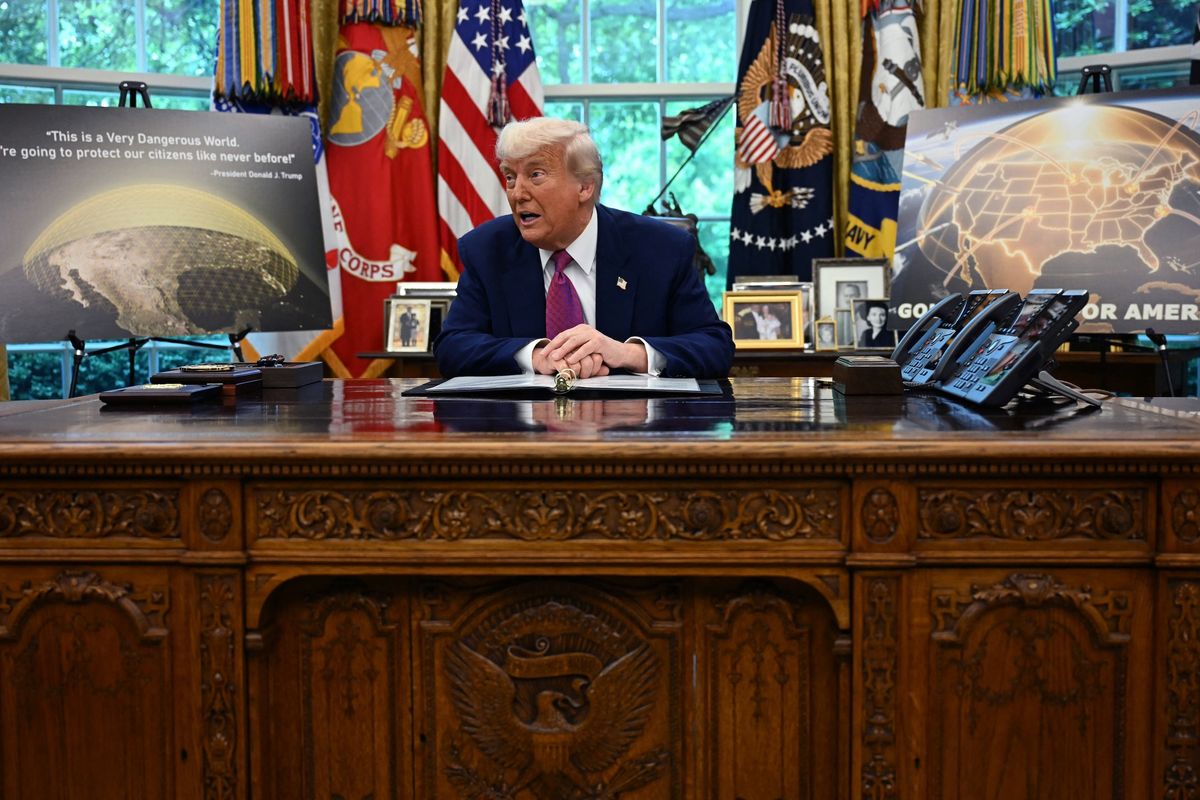In May, the U.S. Ground-based Midcourse Defense system - the GMD - successfully intercepted a mock ICBM in a critical test of the U.S. missile defense umbrella. Given the growing threat of the development of a North Korean ICBM capable of reaching the United States, this is excellent news. However, the failed June 22 test of the sea-based SM-3 interceptor underlines the challenges that remain to perfecting the U.S. missile defense system. This system is largely ground- and sea-based, with advanced radar installations spread across the globe. However, improved space-based sensor arrays – and possibly even interceptors – could vastly increase the effectiveness of this system. The Cipher Brief’s Fritz Lodge spoke with former Air Force Secretary Deborah Lee James about what role space plays in the U.S. missile defense system, and how that role could be enhanced.
The Cipher Brief: What role do space-based systems currently play in the U.S. missile defense system and how has that role changed over the past decade?
Deborah Lee James: I would say that the primary space role in the U.S. ballistic missile defense network is in launch detection. Being able to know that a launch has taken place. It’s very important to know that as early as possible.
By way of background, the U.S. Air Force has a system called the Space-based Infrared System, otherwise known as SBIRS, which has very sensitive infrared sensors on board. And indeed, these sensors are capable of detecting any launch that may occur anywhere in the world. SBIRS can then track that launch during the first-stage burn, and, through a series of calculations, can actually inform us of an estimated impact point.
As far as how the systems have changed, I will tell you that the U.S. government is always looking to see how these capabilities can be improved. Indeed, SBIRS has been improved over time. The sensors and the software have been upgraded so that the functionality has become more sensitive and more accurate over time.
TCB: Talking about space-based detection, surveillance, and tracking, what can we do to improve these capabilities in the coming years, and what kind of investment will that take?
James: The Air Force, and more broadly the whole government, tries to keep track of the threats and how potential adversaries around the world are testing and investing, and of course we have to remain one, two, three steps ahead.
If we turn to what those potential adversaries have been doing that could be relevant in this area, we’ve been watching, for example, progress in both Russia and China with respect to hypersonic technology. Particularly when you’re talking about the space domain, if hypersonic vehicles were to come into use it would become more difficult to track their trajectories because they would travel at extremely high speeds, and perhaps at unexpected trajectories. The hypersonic glide vehicle phenomenon is something that we’re tracking very closely.
Currently, no country has an operational hypersonic glide vehicle, but if something like this were put into use, it would have the potential to strike anywhere in the world in three hours or less. That’s very worrying to the United States.
One of the responses under consideration is a space-based layer of sensors in lower orbits than the SBIRS orbit, which could be a potential offset to the possibility that this hypersonic technology will be put into use down the line.
TCB: You’re better positioned than most people to talk about the interagency and interservice dynamics of how our missile defense coverage is organized. Can you talk a bit about what role each stakeholder – the Missile Defense Agency, or MDA, the Air Force, etc. – plays in the process?
James: We come together in the Department of Defense and bring in other parts of government through what’s called the Defense Space Council. When I was the secretary of the Air Force, I was dual-hatted as the principal defense space advisor. One of my jobs was to chair this Defense Space Council, and the MDA was one of the participants in those discussions and meetings.
That’s one of the ways that we come together. The Air Force role in space is to both contract for satellites and put those satellites into launch mode and into space. We also have a variety of mission responsibilities that we do for ourselves, but also for the joint force.
The MDA is very focused on defense against the possibility of incoming missiles, to protect the U.S. homeland, as well as our allies and partners. That is their specific role, but we work in close coordination with them.
TCB: Looking into the future here a little bit, in your experience have space-based missile interception systems been considered and how feasible would such a system be, especially now that commercial space launch is bringing launch costs down? Could we see the Reagan-era “Star Wars” system become a reality?
James: The DoD, as well as the Air Force, doesn’t like to discuss these options. Everything is always on the table but these are options that, certainly when I was in government, we didn’t like to discuss. A lot of the discussion about this happens more in the classified arena.
Many people have heard Vice-Admiral [James D.] Syring [director of the MDA] refer to the recent ground-based interception test as a “bullet that hit a bullet.” Well, space-based interception would be tantamount to hitting a bullet with a bullet fired from a bullet. In other words, it adds a whole other layer of complexity and difficulty.
Never say never, things are always on the table for consideration, but it’s not something that is openly discussed frequently.
TCB: Talking about that ground-based missile test – very successful from all appearances – what was your reaction to that?
James: I was extremely glad and proud to see that successful test. It’s been a long time coming and an enormous investment on the part of the United States, and it came just in the nick of time. I think it was an important signal for all of us in the United States, but also adversaries and allies, that we do have this technical capability.
At the same time, we do have to understand that it’s not fully functioning yet. This was a test, it’s part of a journey that we’ve been on for some time and will remain on. The other thing, I think, that we have to remember is that the ballistic missile defense system has always been designed to protect us against a limited attack by a state that has a limited number of nuclear missiles. It is not designed to protect against an all-out attack from a major nuclear power.
With that said, the key concern that has been on the table lately is North Korea, and North Korea falls into that category of perhaps being able to do a limited attack on the United States one day. This demonstrates that we have capability to prevent that.
All of this has been good news and we just need to keep moving forward.
TCB: In your ideal scenario, where would we be? If we could put up a perfect space-based ballistic missile detection, tracking, and, possibly, interception system, what would that look like to you? What advantages would that give us?
James: At this point, I’m not convinced that we need an interception capability. As I mentioned, if what we’re doing is deterring against the possibility of a limited attack or – if deterrence fails – we’re protecting against such a limited attack, then I think the ground-based interceptors could well be adequate, at least for the next few decades.
Now, should that change in a major way, then that might indicate going with the space-based interception route. But as I mentioned, that would likely be viewed as a major escalation on our part, and it could lead others to escalate as well. I don’t have any idea what the cost would be but I can only believe, given how technically complex it is, that the bill would be enormous. Although one could speculate that some degree of research is advisable, to go all out in this direction programmatically is not the answer.
My ideal system for space-based sensors and missile tracking would be a system which is much like today’s but with ever-increasing levels of resiliency and survivability. Continuing to invest in higher degrees of sensitivity and accuracy in the sensor instruments. So it would be more of what we’re doing today but with more survivability, greater accuracy, and greater sensitivity.









